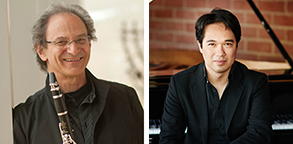by Jarrett Hoffman

“It’s beautiful music and I really look forward to playing it, especially in that church,” Cohen said in a recent conversation. “It’s extraordinary — a beautiful space and a landmark of Cleveland — and it has all Tiffany windows. I’ve always liked playing there.”
Franklin Cohen is co-founder and co-artistic director of ChamberFest Cleveland. He served as principal clarinet of The Cleveland Orchestra from 1976-2015 and soloed with that orchestra nearly 200 times.
Zsolt Bognár has traveled the world as recitalist, chamber musician, and concerto soloist. He won the 2009 Artist Presentation Society Auditions, and released his debut recording Franz & Franz with music by Schubert and Liszt in 2013. He hosts the film series Living the Classical Life, which highlights the inner world, work, and process of famous musicians.
That series provided this story with a fun twist: not only did I have the privilege of speaking to Cohen, but also of watching Bognár’s 2016 interview with the clarinetist, which sparked new questions.
Jarrett Hoffman: You spoke to Zsolt in 2016 about chemistry within an orchestra, saying that if one person hits a home run, it permeates the whole atmosphere. How does that translate to a duo?
Franklin Cohen: It’s the most intimate model of that effect. With two people, every note is either a lead or a reaction, playing off each other’s energy. It’s like a dance.
JH: Zsolt said you two have known each other for about fifteen years.
FC: He and both of my kids went to CIM, and my son made friends with him first. After my wife passed away, Zsolt occasionally house-sat for me and walked the two dogs when I traveled to play solos, chamber concerts, or tours with the orchestra. We’ve had him over many times, so he’s very familiar with my house. The dogs are gone now, but our close friendship has lent itself to him taking over my place when I’m away. And I have a big piano that he enjoys practicing on.
JH: The two of you give a beautiful performance of Schubert’s Nacht und Träume at the end of your conversation [at the 34:26 mark]. Your recital this Sunday also includes art song — Beethoven’s Adelaide and Fauré’s Les berceaux.
FC: In the last five years, I’ve been playing more songs. I’ve always wanted to capture the expression of the voice — the in-between-the-notes sound it can get. That very often eludes the clarinet, and it’s something I’m fascinated by now. I want to be expressive, rather than just get a nice sound and play the notes. If I can achieve those moments, it makes me happy.
I’ve given Nacht und Träume to students to play, and they look at me like, ‘what do I do with this?’ If you play it totally straight, sustaining one nice note to another, it doesn’t work. The voice is sort of like the use of the bow on a string instrument: you have all the different speeds, pressures, and vibrato. The clarinet is played in a more straightforward manner a lot of the time. It can’t access those sounds easily, but it can access them.
JH: Why pair the Poulenc and Brahms f-minor Sonatas?
FC: They’re both late works of the composers. The Poulenc is very beautiful, and it’s one of the first pieces I played with my mom, who was a pianist. I’ve lived with it a long time, though there were many years I didn’t think about it and didn’t play it. It’s really cool music. Brahms had pretty much given up composing at this point in his life, and then he met the clarinetist Richard Mühlfeld. I also played the Brahms sonatas with my mother.
JH: What would you tell audiences about Mieczysław Weinberg?
FC: I find him infinitely fascinating, I love his music. He and his sister escaped from Poland on the last day, I believe, before the Nazis invaded. He found his way to the east and eventually wrote to Shostakovich, who helped him come to Moscow, and the two became very close friends. There’s a huge crossover in their music, but I’m not sure whether Shostakovich comes out of Weinberg, Weinberg out of Shostakovich, or both.
This sonata is from Weinberg’s early period — he was probably running and figuring out where he would end up living. It has elements of his early life, and in a way this piece is running away from that. It covers the gamut of emotions, and it’s totally unique, his own language.
His output was huge — 22 symphonies and 17 string quartets — yet nobody knows him. I would urge people to check out his opera The Passenger. In the past five years it’s been done by leading houses of the U.S., and it’s extraordinary, I think one of the great operas.
JH: You told Zsolt you own 30 or 40 clarinets, but despite some issues they have, you always go back to the ones that were made in the ‘60s and ‘70s because of the sound of the old wood.
FC: When I was in my mid-teens, my mother bought me my first good instrument, a Buffet R13. They put out a brochure that showed most of the most famous clarinetists — Benny Goodman, Artie Shaw, Stanley Drucker — and they all played R13’s. That was the instrument.
Over the years, I think they started over-designing instruments to fix flaws in people’s playing. I want to like the new models, so I try them for a week, and by the end of that I’m ready to kill someone. I loathe them, because they’re not me anymore. But to each his own.
Like most people, I’m always looking for an improvement. But I always go back to the old faithful, even though some things haven’t been improved. I do that because it forces me to be me.
Published on ClevelandClassical.com January 16, 2017.
Click here for a printable copy of this article


